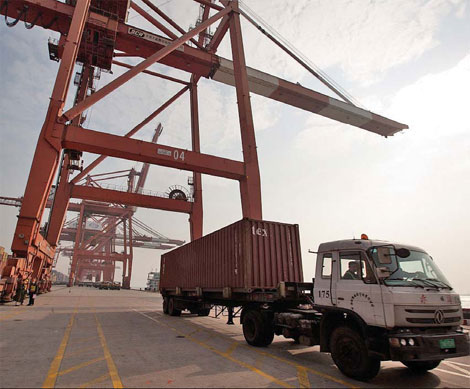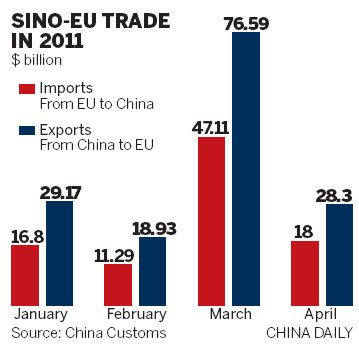Economy
China-EU trade on solid ground
Updated: 2011-05-13 10:30
By Zhong Nan (China Daily European Weekly)
 |
|
A trucker moves a transport container from a ship at Shekou Port in Shenzhen, Guangdong province. China's trade surplus for April widened to $11.42 billion from $139 million in March. Forbes Conrad / Bloomberg |
The trade between China and the European Union remained stable in the first four months of this year, a sign of strong and stable trade ties, economists say.
Bilateral trade jumped 23.5 percent year-on-year to $46.3 billion (32.6 billion) in April, China's General Administration of Customs said. The country had a $29.48 billion surplus with the EU in the first quarter of this year, with bilateral trade rising 22 percent year-on-year to $123.7 billion.
"Trade structure and relations between China and the EU are fairly complementary and cooperative. China is used to purchasing high-tech, green, biological, machinery and electronic products from the EU and has close trade connections with various European suppliers," says Chen Yongjun, a professor at the School of Business of Renmin University of China in Beijing.
Chen says the EU, China's largest trade partner, relies on advanced technologies and unified quality standards to export a comprehensive range of products to China.
Exports to the EU in April grew by 27 percent from a year earlier to $28.3 billion, while imports surged 29 percent to $18 billion.
Chen Zhimin, deputy director of the Center for European Studies at Shanghai-based Fudan University, says economic interdependence, technological cooperation and political dialogue are three core pillars that have helped to develop a stable China-EU trade relationship.
"Both Beijing and Brussels are keen to deepen their economic corporation in many fields. Unlike the complex China-US trade relations, there are no serious conflicting interests, such as political issues or harsh trade barriers, between China and the EU. The EU also wishes to export more goods to China during the economic downturn," Chen Zhimin says.
Zhao Junjie, a senior researcher of European studies at the Chinese Academy of Social Sciences in Beijing, says China should diversify exports on traditional products, modern services and emerging industries to the EU market," he says.
Zhao believes prices of the EU import products will slightly rise in the second quarter of this year as the global prices of various raw materials and crude oil have surged notably in recent months.
According to Customs statistics, China registered a deficit of $1.2 billion in the first quarter, but it bounced back in April with a trade surplus of $11.42 billion.
April exports rose 29.9 percent from a year earlier to $155.7 billion, and imports increased by 21.8 percent to $144.3 billion.

"As China's tightening measures to cool the economy and choke back liquidity of capital, imports of commodities dropped and import growth is lower than expected," says Li Wei, an economist from Standard Chartered Bank (China) Limited.
"Overseas demand is still strong and the economies of the EU and the US are recovering well," says Zhou Shijian, a senior trade expert from Tsinghua University in Beijing.
From January to April, China's overseas shipments of the mineral coke grew by 409 percent year-on-year and precious metals surged by 111 percent.
Exports of mechanical and electrical goods, which accounted for 57.6 percent of the nation's exports, rose by 22.9 percent year-on-year to $319.8 billion in the first four months of this year.
China's exports from January to April to the EU rose by 19.7 percent year-on-year. In the period, Chinese exports to the US rose by 22.4 percent, while those to Japan grew by 27 percent.
"This suggests that the demand from developed economies may have been stronger than we thought," says Wang Tao, head of China Economic Research with UBS Securities.
"We do not expect the April data to have any obvious impact on the pace and magnitude of the appreciation of the renminbi," Wang says.
At the recent Canton Fair, Chinese manufacturers and exporters complained that the appreciation of the Chinese currency and the rising cost of labor have affected profit margins, raising concerns that exports could decline.
"These factors have a limited impact on China's exports in the short term. We will not see the real impact for many months," Li says.
The economist predicts "Chinese exports will continue to be robust this year, but they will be outperformed by the growth in imports, narrowing the surplus this year".
Specials

The song dynasty
There are MORE THAN 300 types of Chinese operas but two POPULAR varieties are major standouts

Sino-US Dialogue
China and the US hold the third round of the Strategic and Economic Dialogue from May 9-10 in Washington.

Building communities
American architect John Portman and his company have developed more than 30 projects across China.